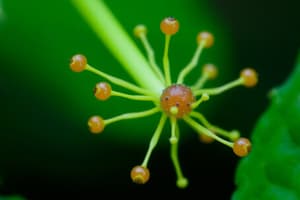Podcast
Questions and Answers
What is the primary difference between prokaryotic and eukaryotic cells?
What is the primary difference between prokaryotic and eukaryotic cells?
Prokaryotic cells lack membrane-bound organelles and a nucleus, while eukaryotic cells contain both.
Identify one key function of mitochondria in eukaryotic cells.
Identify one key function of mitochondria in eukaryotic cells.
Mitochondria are responsible for cellular respiration and provide energy for the cell.
What is the role of ribosomes in a cell?
What is the role of ribosomes in a cell?
Ribosomes are responsible for protein synthesis.
What are alleles in the context of genetics?
What are alleles in the context of genetics?
Define what a food web is in an ecological context.
Define what a food web is in an ecological context.
What are the main components of biological molecules in living organisms?
What are the main components of biological molecules in living organisms?
What is the primary focus of botany?
What is the primary focus of botany?
What does ecology study?
What does ecology study?
What is heredity?
What is heredity?
How does metabolism differ from growth in living organisms?
How does metabolism differ from growth in living organisms?
What role does adaptation play in the survival of organisms?
What role does adaptation play in the survival of organisms?
List the steps of the scientific method in biology.
List the steps of the scientific method in biology.
Define ecology and its focus within biology.
Define ecology and its focus within biology.
Why is homeostasis crucial for living organisms?
Why is homeostasis crucial for living organisms?
What is the significance of genetics in biology?
What is the significance of genetics in biology?
What is the primary focus of microbiology?
What is the primary focus of microbiology?
Flashcards
Biology
Biology
The study of life and living organisms
Botany
Botany
The study of plants
Scientific method
Scientific method
A systematic approach to studying the natural world
Observation (in science)
Observation (in science)
Signup and view all the flashcards
Hypothesis
Hypothesis
Signup and view all the flashcards
Metabolism
Metabolism
Signup and view all the flashcards
Adaptation
Adaptation
Signup and view all the flashcards
Homeostasis
Homeostasis
Signup and view all the flashcards
Cell
Cell
Signup and view all the flashcards
Prokaryotic Cell
Prokaryotic Cell
Signup and view all the flashcards
Eukaryotic Cell
Eukaryotic Cell
Signup and view all the flashcards
Mitochondria
Mitochondria
Signup and view all the flashcards
Biological Molecule
Biological Molecule
Signup and view all the flashcards
Carbohydrate
Carbohydrate
Signup and view all the flashcards
Ecology
Ecology
Signup and view all the flashcards
Ecosystem
Ecosystem
Signup and view all the flashcards
Study Notes
Branches of Biology
- Biology is the study of life and living organisms.
- It encompasses a vast field, with many interconnected branches.
- Some major branches include:
- Botany: The study of plants.
- Zoology: The study of animals.
- Microbiology: The study of microorganisms, such as bacteria, viruses, and fungi.
- Genetics: The study of genes, heredity, and variation in organisms.
- Ecology: The study of the interactions between living organisms and their environment.
- Physiology: The study of the functions of living organisms and their parts.
- Molecular Biology: The study of biological molecules such as proteins and nucleic acids.
- Biochemistry: The study of the chemical processes that occur within living organisms.
- Evolutionary Biology: The study of the processes that have led to the diversity of life on Earth.
- Cell Biology: The study of cells, their structure, and function.
Characteristics of Living Organisms
- Living organisms share several key characteristics.
- These characteristics help distinguish them from nonliving things.
- The key characteristics include:
- Organization: Living things have complex organization, from the molecular level to the organismal level.
- Metabolism: Living organisms have to take in and use energy to stay alive.
- Growth: Living things grow and develop as a result of cell division and differentiation.
- Adaptation: Organisms adapt to their environment over time through natural selection.
- Reproduction: Living things produce offspring to continue their species.
- Response to stimuli: Living things react to changes in their environment.
- Homeostasis: Maintaining a stable internal environment despite external changes.
The Scientific Method in Biology
- The scientific method is a systematic approach to understanding the natural world.
- It involves a series of steps to investigate a phenomenon or solve a problem.
- The steps often include:
- Observation: Identifying a particular phenomenon.
- Question: Asking a specific question about the observation.
- Hypothesis: Proposing a possible explanation for the observation.
- Prediction: Making a specific prediction based on the hypothesis.
- Experiment: Designing and conducting an experiment to test the prediction.
- Data analysis: Analyzing the data gathered from the experiment.
- Conclusion: Drawing a conclusion based on the experimental results.
Cell Structure and Function
- Cells are the basic units of life.
- Different types of cells have different structures and functions.
- Cells can be categorized as eukaryotic or prokaryotic.
- Prokaryotic cells lack membrane-bound organelles and a nucleus.
- Eukaryotic cells have membrane-bound organelles and a nucleus.
- Key organelles in eukaryotic cells include:
- Nucleus: Controls the cell's activities.
- Mitochondria: Powerhouse of the cell, responsible for cellular respiration.
- Ribosomes: Responsible for protein synthesis.
- Endoplasmic reticulum: Involved in protein synthesis and lipid metabolism.
- Golgi apparatus: Involved in processing and packaging proteins.
Biological Molecules
- Biological molecules are essential components of living organisms.
- They perform various roles in cellular processes.
- Important biological molecules include:
- Carbohydrates: Provide energy and structural support.
- Lipids: Store energy, form membranes, and act as hormones.
- Proteins: Catalyze reactions, provide structure, and regulate processes.
- Nucleic acids: Store and transmit genetic information.
Genetics
- Genetics is the study of genes, heredity, and variation in organisms.
- Genes are segments of DNA that carry instructions for making proteins.
- DNA (deoxyribonucleic acid) is the molecule that carries genetic information.
- Different forms of genes are called alleles.
- Heredity is the transmission of genetic traits from parents to offspring.
- Genetic variation is the differences in the traits among individuals of the same species.
Ecology
- Ecology is the study of the interactions between living organisms and their environment.
- This includes the study of populations, communities, ecosystems, and the biosphere.
- Key ecological concepts include:
- Populations: Groups of the same species living in a particular area.
- Communities: All the populations living in a particular area.
- Ecosystems: Communities of organisms interacting with their physical environment.
- Food chains: Sequential feeding relationships between organisms.
- Food webs: Complex networks of interconnected food chains.
- Biomes: Large-scale ecosystems characterized by specific climates and plant life.
- Nutrient cycles: The movement of nutrients through the ecosystem.
Studying That Suits You
Use AI to generate personalized quizzes and flashcards to suit your learning preferences.




